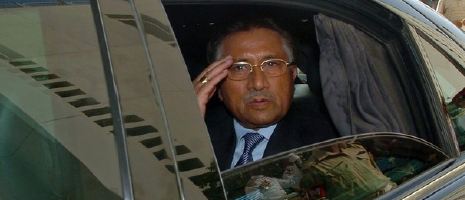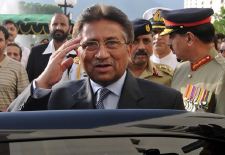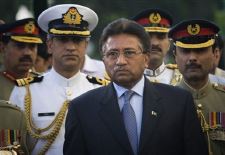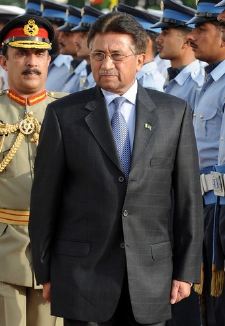Adil Najam
In a nationally televised speech, Gen. Pervez Musharraf, President of Pakistan, has just announced his resignation, pre-empting a move to impeach him by the parliament.
This post has been updated to add news photos from this momentous day in Pakistan’s political history. The pictures speak eloquently of the moods and thoughts of the day. (Scroll down to see the video of Gen. Musharraf’s resignation speech).
Participate in a poll on what might be Pakistan’s future post-Musharraf, here.
![]()
Here is a Pervez Musharraf time-line, published in The News:
August 1943: Born in Delhi, India
1964: Joins Pakistani army.
1998: Becomes army chief of staff.
October 1999: Seizes power in a bloodless military coup, overthrowing the prime minister, Nawaz Sharif. In response, the Commonwealth suspends Pakistan’s membership.
June 20 2001: Makes himself president, replacing Rafiq Tarar, while remaining head of the army. Tarar is forced out of office when the parliament that elected him is dissolved.
July 2001: Holds first meeting with the Indian prime minister, Atal Bihari Vajpayee, at Agra in India. No progress is made because of differences over the disputed territory of Kashmir.
September 2001: George Bush courts Musharraf, asking him to join him in his “war on terror” and help defeat the Taliban in neighbouring Afghanistan. The US president promises Pakistan $1bn in aid.
April 2002: Wins a referendum giving him another five years in office. Observers criticise the referendum as blighted by irregularities.
May 2002: Pakistan test fires three medium-range surface-to-surface missiles capable of carrying nuclear warheads. Musharraf insists his country would not be the one to initiate war.
August 2002: Consolidates his power still further, giving himself the right to dismiss an elected parliament.
October 2002: Pakistan’s first general election since Musharraf seized power in 1999 results in a hung parliament.
November 2002: Mir Zafarullah Jamali becomes the first civilian prime minister since 1999. He is a member of a Musharraf-supporting party.
November 2003: Pakistan’s National Assembly meets for the first time since 1999.
December 2003: Musharraf promises to step down as head of the army by January 2005.
May 2004: Pakistan is readmitted to the Commonwealth.
December 2004: Musharraf announces he will stay on as head of the army.
August 2005: Pakistan tests its first nuclear-capable cruise missile.
March 2007: Musharraf suspends the chief justice, Iftakar Mohammed Chaudhry, triggering a wave of anger across the country and the first joint protests held by the parties of exiled former prime ministers Benazir Bhutto and Nawaz Sharif.
October 2007: Signs a corruption amnesty, opening the way for Bhutto’s return and a possible power-sharing agreement. Within hours of Bhutto’s arrival back in the country, bombers attack a Bhutto rally in Karachi, killing more than 100 people.
November 2007: Declares a state of emergency, rounding up opposition leaders at gunpoint. In the same month, Musharraf quits as head of the army, becoming a civilian president.
December 15 2007: Lifts state of emergency and announces plans to go ahead with parliamentary elections scheduled for January 8.
December 27 2007: Benazir Bhutto is assassinated at an election rally in Rawalpindi.
January 2008: Elections postponed until February 18.
February 2008: The two main opposition parties gain a clear majority in the elections.
August 2008: The two main parties strike a deal to impeach Musharraf if parliament backs the move.
August 18 2008: Musharraf announces his resignation



























































Musharraf did many good things for the country in his early years of dictatorship.
BUT… that in no way handed him the license to do to his own people what he did during the Lal Masjid incident, and 100s of incidents of the likes of Dr. Affia.
And no, things are not going to be great after he has left, as we have still many corrupt and idiotic politicians still there in the assembly.
What needs to be done is the judiciary to be restored, and all the corruption cases against the corrupt politicians be brought to life again.
Musharraf is one of the GREATEST leader Pakistan has ever had so far! His departure is in accordance with democratic norms and those who are in jubilation dancing and distributing sweets in the streets are the same who were doing absolutely the same thing when Nawaz Sharif was removed!
Secondly, those who demand Musharraf’s humiliation as a criminal etc., are out of touch with reality in Pakistani politics. Do you really think Army will allow the humiliation of its ex-Chief (after the Jehangir Karamat debacle in the hands of the ganja khalifa) at the hands of these morally and mentally corrupt politicians?
He did the right thing and should have done it a long time ago in a more graceful manner. But…
This is the saddest day in the history of Pakistan. Today we have proven that we do not deserve intelligent and capable leaders.An eyeopener for all those patriots out there who think they can make Pakistan a better place ! this is how you’ll end up.What a waste of all the hard work done in all these years. Thanks to the media too for playing such a great role in destablising our country. With such intelligent brains in the media and in the form of these sick politicians we don’t need any outside force to break our country apart. They are doing a great job. May Allah The Almighty help us.
> People bandy about the concept of democracy like its a holy grail- hasn